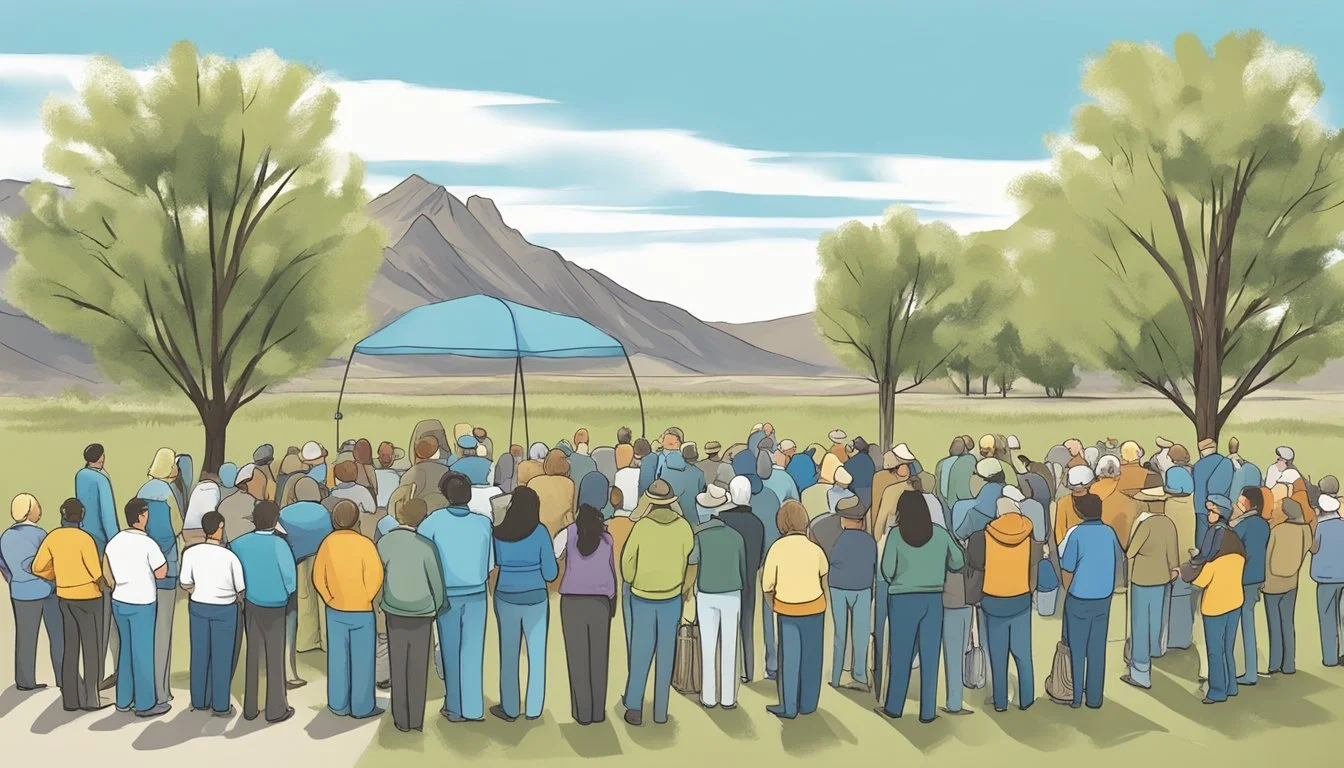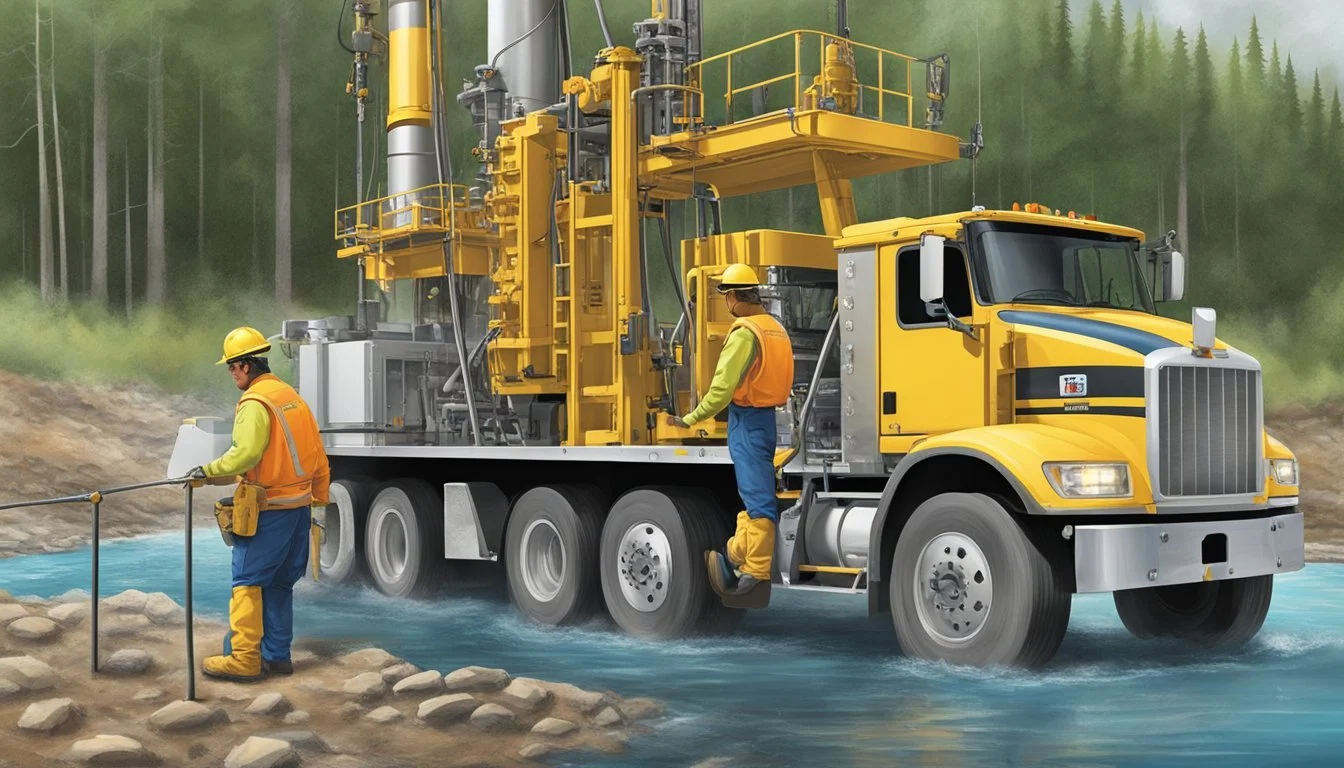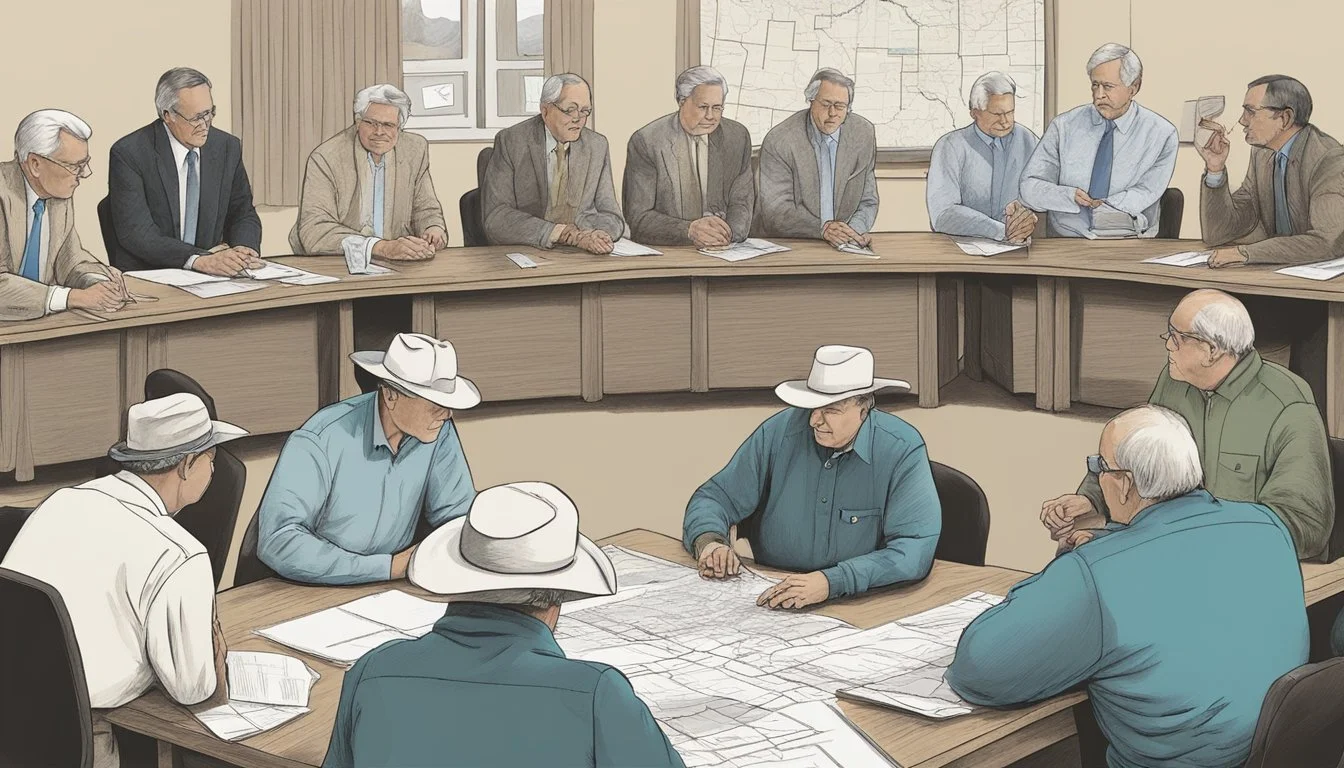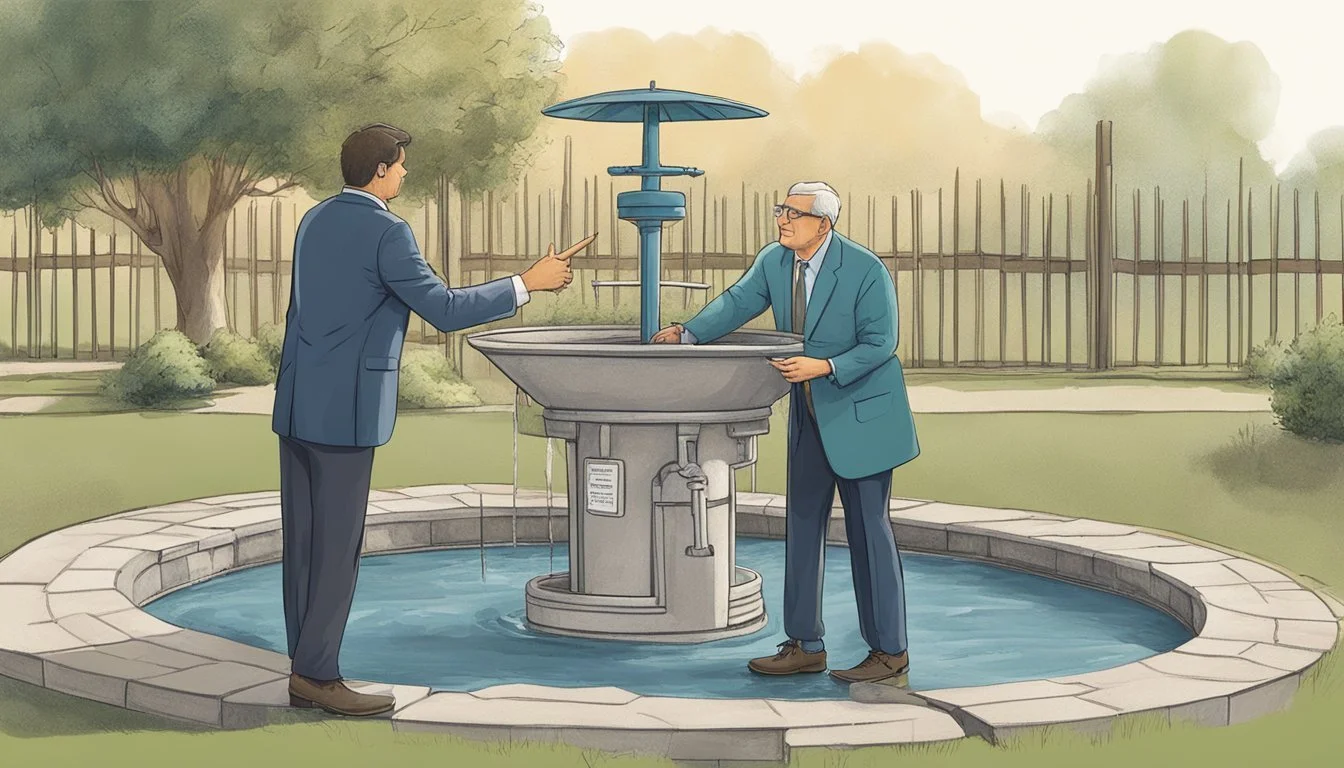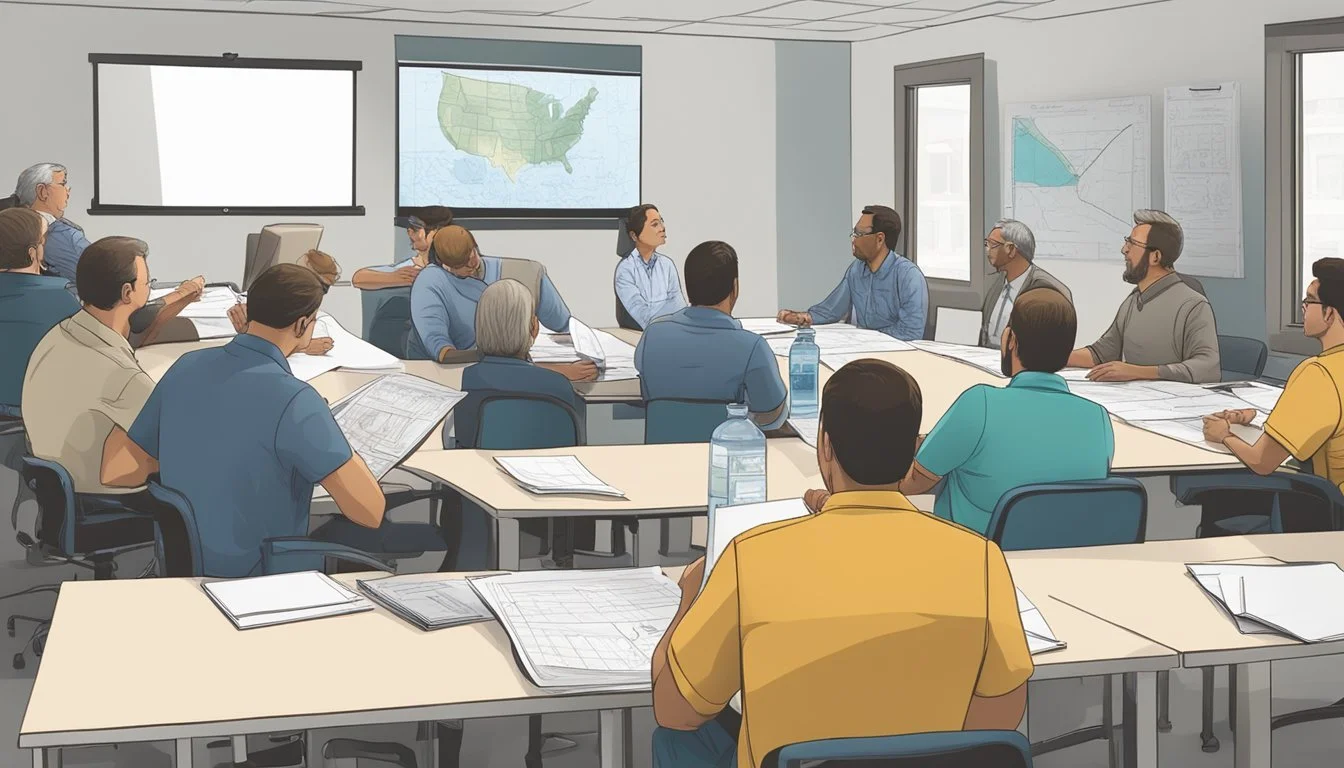Wyoming Water Well Regulations
Understanding Compliance for Well Owners
Wyoming's landscape is home to a vital resource—water, a necessity for agriculture, industry, and personal use. To protect this invaluable resource, the state has implemented stringent regulations governing water well construction, alteration, and rehabilitation. Wyoming requires individuals engaging in these activities to possess the appropriate license, except under specific circumstances such as oil and gas well work, which falls under different permitting rules. These regulations are designed to safeguard groundwater from contamination and ensure sustainable water use for future generations.
Understanding the specifics of these regulations is critical for anyone involved in water well development in Wyoming. The Water Well Minimum Construction Standards spell out the details of well site selection, design, construction materials, and reporting requirements. These rules are periodically revised, reflecting the evolving understanding of groundwater management and the necessity to adapt to new challenges.
The effective management of Wyoming's groundwater resources hinges on adherence to these regulations, with a collaborative approach amongst the Wyoming State Engineer's Office, the Water Well Contractors Licensing Board, and the Department of Environmental Quality. Their combined efforts ensure that water wells are constructed and maintained to prevent negative impacts on the environment and public health, demonstrating Wyoming's commitment to responsible water resource management.
Regulatory Framework
Wyoming's water well regulations are anchored by a well-defined structure involving the State Engineer, the Ground Water Division, the Board of Control, and a comprehensive set of rules and regulations. This framework ensures water well construction adheres to established standards, maintaining the safety and sustainability of the state's water resources.
State Engineer's Role
The State Engineer serves as the chief authority in regulating water well construction in Wyoming. They have the power to enforce and interpret the rules and regulations set by the state. Licensing for well construction and the installation of pumping equipment falls under the jurisdiction of the State Engineer, ensuring that all water well activities are conducted legally and with due regard to state statutes.
Ground Water Division
The Ground Water Division, operating under the State Engineer's Office, administers the ground water resources. The division manages the permitting process for water well construction and oversees the regulation of ground water use. The goal is to balance the needs of various stakeholders with long-term water conservation objectives.
Board of Control
The Board of Control is a key regulatory body within the state's water governance ecosystem. It comprises the State Engineer and four Division Superintendents. This board is primarily responsible for the adjudication of water rights and the approval of permits for water well construction.
Rules and Regulations
Wyoming has established a detailed set of Rules and Regulations that dictate the minimum construction standards for water wells. All water well contractors must comply with these guidelines to ensure the safety and functionality of wells. The rules also state that no person may construct, alter, or rehabilitate water wells or install pumping equipment without proper licensing, unless exempted under specific provisions.
Permitting Process
The permitting process for water wells in Wyoming is a structured set of procedures ensuring legal and safe access to water resources. Entities and individuals must adhere to state regulations throughout the entire process.
Water Well Permit Requirements
To legally construct or modify a water well in Wyoming, entities must obtain the proper permit. According to the Wyoming State Engineer's Office - Water Well Construction, operating without a permit may result in legal consequences. The necessary forms for application can be found on the State Engineer's Office website, which detail requirements such as property owner information, well specifications, and intended water use.
Notice of Intent
Before any drilling can commence, a Notice of Intent to drill must be submitted and approved. This document alerts the Wyoming State Engineer's office to the planned water well construction and includes specifics like location, water use purpose, and well design. The Notice serves to inform competent authorities and allows them to provide input regarding the sustainability and impact of the proposed water extraction on local resources.
Water Right Adjudication Inspections
After a water well is constructed, Water Right Adjudication Inspections might be required to validate that the water extraction is within legal rights and does not impinge on existing water rights. It is an essential process to ensure the proper allocation and use of water resources. The inspection confirms that the construction and water withdrawal adhere to the terms stipulated in the permits and water rights, guarding against the illegal usage of water.
Water Well Construction Standards
In Wyoming, water well construction is regulated to ensure safety and protect groundwater resources. The standards are detailed and specific, covering everything from minimum construction requirements to specialized wells for monitoring purposes.
Minimum Construction Requirements
According to the Wyoming State Engineer's Office, strict requirements are set for water well construction to prevent contamination and to protect water resources. These include detailed specifications for casing and screen materials that must meet the American Petroleum Institute (API) and National Sanitation Foundation (NSF) standards. Key components of these standards encompass:
Casing: The proper installation and materials for casing are crucial. It must be sturdy enough to prevent well collapse and prevent contaminants from seeping into the well. Casing material specifications ensure only safe, durable, and contaminant-free products are used.
Screen: Well screen requirements are designed to optimize water flow and minimize sediment entry. The selection of screen size and material is tailormade for the geological conditions of the well site.
Monitoring and Observation Wells
The establishment of an effective observation well network is necessary for long-term groundwater monitoring. Here, construction standards are meticulously designed to provide accurate data that can inform resource management decisions and detect early signs of contamination. The standards for these wells include:
Design: Monitoring wells must be constructed to allow for the accurate measurement of water levels and quality.
Construction oversight: Qualified professionals must design and supervise the construction of monitoring wells to ensure compliance with the prescribed standards.
Public Water Supplies
For wells purposed for public water supplies, additional construction criteria are applied to safeguard public health. These standards focus on:
Preventing contamination: To avert the risk of contamination, wells for public water supplies have rigorous lining and casing requirements.
Consistent monitoring: Regular assessments are mandatory to ensure the continued safety and quality of the public's drinking water.
Wyoming's water well construction standards are comprehensive frameworks designed to underpin the integrity and reliability of the state's water wells, thereby ensuring the protection of groundwater resources for various uses.
Licensing and Compliance
In Wyoming, strict regulations govern the construction and maintenance of water wells, ensuring the safety and legal compliance of water well contractors and water well pump installation contractors.
Contractors Licensing
In Wyoming, individuals seeking to construct, alter, or rehabilitate water wells must obtain a license from the Wyoming Water Well Contractors Licensing Board. The licensing process is detailed and designed to ensure that contractors have the necessary skills and knowledge to comply with state regulations.
Requirements: Candidates must pass an examination and meet other criteria as determined by the State Board of Examining Water Well Drilling Contractors & Water Well Pump Installation Contractors.
Renewal: Licenses must be renewed periodically, with contractors required to demonstrate ongoing compliance with updated standards.
Interference Investigations
The State Engineer's Office conducts interference investigations to evaluate claims of water wells adversely affecting neighboring water rights.
Process: Investigations require thorough examination and fact-finding to determine if the well in question is causing interference.
Outcome: If interference is established, remedial action is mandated, which may include modification or cessation of well operation.
Water Well Pump Installation Compliance
Compliance with water well pump installation regulations is critical, and contractors must follow the Minimum Construction Standards.
Standards: Installation must adhere to specific construction and material standards to prevent contamination and ensure the integrity of the water supply.
Inspections: Regular inspections by the licensing board ensure ongoing compliance and the safety of water resources.
Wyoming maintains a robust framework to regulate water well contractors and water well pump installations, ensuring the responsible management of the state's groundwater resources.
Water Resources Management
In Wyoming, the management of water resources is a critical task overseen by state entities to ensure equitable water supply and maintain water quality. The regulations are designed to balance the needs of groundwater allocation, surface water appropriators, and the imperative of beneficial use and conservation.
Groundwater Allocation
The state of Wyoming mandates that anyone aiming to construct, alter, or repair a water well must adhere to regulations that ensure the proper use and protection of groundwater resources. Under Wyoming State Engineer’s authority, stringent standards are in place for water well construction which are instrumental for preserving groundwater quality and maintaining a sustainable water supply. For more detailed guidelines, refer to the Water Well Minimum Construction Standards as established by the Wyoming State Engineer.
Surface Water Appropriators
Surface water users are subject to a priority system defined by the State Engineer’s Office which dictates the beneficial use of surface water. This ensures that appropriators with senior water rights receive their allocated water and that all appropriations are regulated to avoid overuse. The state’s rules on water treatment and distribution aim to support water quality for all users. The SEO Groundwater Rules and Regulations provide more insight into the management of surface water rights.
Beneficial Use and Conservation
Conservation of water resources in Wyoming is tied to the doctrine of beneficial use, which requires that any withdrawal from both groundwater and surface water sources must serve a beneficial purpose. This use includes but is not limited to, irrigation, municipal use, industrial use, and environmental preservation. Strategies for water treatment and conservation are crafted to reinforce water quality and sustainable use. The Regulations and Instructions - Part III, by the State Engineer, outline the criteria for beneficial use.
Public Engagement
In Wyoming, the integration of public voice in water well regulation is facilitated through structured processes and dedicated entities. This ensures that stakeholders have avenues for participation and their concerns are addressed with clarity and efficiency.
Public Hearing Process
Public hearings are a cornerstone of the regulatory framework in Wyoming. They offer a platform where interested parties can gather to express concerns, provide feedback, and voice opinions on water well regulations. Typically, notices about upcoming hearings are available on relevant government websites and local press, ensuring transparency and ample opportunity for public comment.
Water Well Contractors Board
The Wyoming Board of Water Well Contractors plays a pivotal role in regulating the construction and maintenance of water wells. They are responsible for licensing contractors and upholding standards of practice. The board frequently solicits feedback from the public through comments on proposed regulations, ensuring their decisions reflect a consensus that considers the insights of various stakeholders.
Conflict Resolution and Response
When disagreements or grievances arise, there is a process in place for conflict resolution. The state provides clear guidelines for filing complaints against licensed well contractors, which are then reviewed by the board. A meticulous approach ensures that each response by the board is thorough and well-considered, aiming for resolutions that align with established state laws and quality standards. This process not only reinforces accountability but also upholds the integrity of the state's water resources.
Operational Guidelines
In Wyoming, maintaining the integrity of water resources is paramount. Robust regulations regarding the installation and modification of water wells ensure both safety and environmental protection.
Pumping Equipment Standards
The construction or alteration of water wells in Wyoming necessitates adherence to specific standards for pumping equipment. This includes the requirement for licensed professionals to undertake such tasks, ensuring compliance with the established Wyoming State Engineer's Office regulations. Contractors must follow a precise protocol for the installation of pumping mechanisms to avoid any unauthorized practices that might jeopardize water quality.
Backflow Prevention
To prevent contamination of clean water sources, stringent backflow prevention measures are mandated. The State enforces these measures to avoid the reverse flow of potential pollutants into the water supply. Regulations stipulate that appropriate backflow prevention devices must be incorporated, as outlined by the Rules and Regulations provided by the Wyoming Board of Water Well Contractors, ensuring that water remains uncontaminated by any substances that could reverse through the system.
Legal and Administrative Procedures
In Wyoming, the construction, alteration, or rehabilitation of water wells adheres to strict statutory requirements, ensuring environmental safety and resource management. The legal framework also provides a mechanism for applying for waivers or variances under certain conditions, and the State Engineer has the authority to issue administrative orders in accordance with established regulations.
Waiver or Variance Applications
Applicants seeking exemption from standard water well construction regulations may apply for a waiver or variance. The application must be submitted to and approved by the proper authorities, which, according to the Wyoming State Engineer's Office, is contingent on demonstrating that the waiver will not violate the intents of the statutes.
Administration and Orders
The administration of water well regulations in Wyoming is a systematic process that involves the enforcement of standards and the issuance of orders. Compliance is mandated and the State Engineer's Office may order the cessation of water flow from any well that is determined to be out of compliance with the state's minimum well construction standards. These regulations serve the dual purpose of protecting groundwater resources and ensuring their sustainable use.
Resources and Additional Information
In Wyoming, water well construction and groundwater management are important topics for landowners and developers. This section provides specific resources and avenues for further information, including contact details for the State Engineer's Office and access to relevant research and publications.
Guidelines and Contact Information
The Wyoming State Engineer's Office is responsible for the supervision of the state's water resources. This includes establishing standards for water well construction to protect groundwater. For further guidance or to raise inquiries, individuals can contact the office at their Casper location. Details are as follows:
Office Address: Wyoming State Engineer's Office, Casper, WY 82601
Contact Us: The 'Contact Us' section on their website provides phone numbers and email addresses for specific queries and support.
Research and Publications
The office provides a repository of research and publications that shed light on water well standards and groundwater management. These documents can be found under the Water Well Minimum Construction Standards. Vital research and statistics are included here to help understand the rules and outcomes of proper well construction, which is pertinent for those engaged in or planning water well projects. For papers and detailed publications, one can refer to the Wyoming Department of Environmental Quality; they monitor and report on the state's water quality and publish their findings on their Know Your Well page.
State and Local Coordination
Wyoming's water well regulations necessitate close collaboration between state entities, including the Wyoming State Engineer's Office and local agencies, to ensure sustainable water management and compliance with statutory requirements.
Local Regulations and Involvement
Local agencies play a crucial role in the implementation of water well regulations within their respective jurisdictions. They ensure that well construction and alteration adhere to both state statutes, such as those set forth in W.S. 33-42-101 through 33-42-117, and local ordinances. Collaboration with water divisions is essential in this regard, as it allows for tailored oversight that addresses specific regional water issues.
Wyoming Water Development Commission
The Wyoming Water Development Commission works in conjunction with the State Engineer's Office to fund and guide water projects, which encompasses aspects of well construction and maintenance. Their combined efforts ensure the practical and lawful execution of water development initiatives while also taking into account local needs and resources as guided by state regulations.
Environmental Protection
Wyoming takes measures to safeguard its water resources, particularly through regulatory means to protect underground water from potential contamination. With notable focus on the construction and operation of water wells, the state addresses the environmental impacts of oil and gas extraction activities as well.
Groundwater Protection Initiatives
Wyoming's regulatory framework ensures the protection of groundwater by maintaining strict construction standards for water wells. The Wyoming State Engineer's Office stipulates it is unlawful to construct, alter, or rehabilitate a water well without the proper licensure. These regulations not only safeguard the water supply but also promote responsible usage and conservation of underground water resources. Compliance with these standards is essential for preventing contamination and preserving water quality.
Response to Oil and Gas Wells
In Wyoming, the intersection of water well integrity and oil and gas well activities is critical. While oil and gas wells are permitted under separate provisions, such as W. S. 30-5-115, there are protections in place to minimize their impact on groundwater. The Wyoming Department of Environmental Quality provides tools and programs for Source Water and Wellhead Protection, aiming to prevent pollution from affecting public water supplies. These programs are integral to the state's proactive approach in balancing resource extraction with environmental stewardship.
Innovations in Water Well Technology
Recent advancements in technology have significantly improved the efficiency and effectiveness of water well construction and management in Wyoming. These innovations address both the challenges of advanced drilling techniques and ensuring water supply adequacy.
Advanced Drilling Techniques
New drilling technologies have revolutionized well construction, allowing for more precise and less intrusive methods. Horizontal drilling, for instance, permits access to water resources with minimal surface disruption. This method allows for drilling parallel to the water table, increasing contact with the aquifer. Employing real-time monitoring systems, contractors can now make immediate adjustments to the drilling process, enhancing safety and reducing environmental impact. The Wyoming State Engineer's Office outlines regulations to ensure these advancements in drilling technology adhere to strict standards for water well construction.
Water Supply Adequacy
Ensuring an adequate water supply is essential in arid states like Wyoming. Technological improvements aid in assessing the sustainability of water resources before well construction commences. Techniques such as aquifer performance tests (APTs) provide critical data on the availability and replenishment rates of groundwater sources. Incorporating these tests into planning helps in maintaining the balance between water withdrawal and conservation. The Wyoming Board of Water Well Contractors implements rules that support the responsible use of groundwater resources, reflected in their comprehensive Rules and Regulations.
Through continuous innovation in water well technology, Wyoming is positioned to sustainably meet its present and future water needs.
Dispute Resolution Mechanisms
In the context of Wyoming water well regulations, specific processes are in place for resolving disputes that may arise between stakeholders, including surface water appropriators.
Adjudication Processes
When conflicts occur regarding water wells in Wyoming, especially those that may affect surface water appropriators, the state offers a structured adjudication process. This process provides a legal framework through which disputes are heard and decided upon by the appropriate authorities. The Wyoming State Engineer's Office plays a crucial role, particularly when the dispute involves both ground and surface water users, ensuring that the regulations adhering to Wyoming Statutes W.S. 33-42-101 through 33-42-117 are appropriately followed. These statutes outline the necessity for licensure in water well construction and modification, which may become points of contention requiring adjudication.
Educational and Technical Support
Wyoming provides critical educational and technical support to ensure safe and compliant water well construction and maintenance. These resources reinforce the standards and regulations set forth by state authorities.
Workshops and Training
Workshops and training sessions are regularly organized by the Wyoming Board of Water Well Contractors to educate contractors on Water Well Minimum Construction Standards. These workshops often cover a variety of topics, including the correct methods for constructing, altering, or rehabilitating water wells, as mandated by state regulations.
Participants receive up-to-date information on the latest practices in water well construction, which adheres to the Wyoming Statute 33-42-101 through 33-42-117. These educational programs aim to ensure that contractors possess the necessary knowledge and skills to protect Wyoming's water resources.
Technical Assistance
In addition to educational initiatives, technical assistance is available to both licensed contractors and the public. This support includes providing clarification on the Rules and Regulations set by the Wyoming Board of Water Well Contractors, addressing any ambiguities related to well construction standards.
The Wyoming State Engineer's Office offers guidance to ensure compliance with the statutes governing water well construction. Their assistance is vital in circumstances where technical complexities arise, ensuring that all water well construction and maintenance activities are aligned with legal and safety requirements.
Frequently Asked Questions
When it comes to understanding water well regulations in Wyoming, it’s essential that the specifics are clear. These FAQs provide crucial information for anyone looking to navigate well construction and water rights in the state.
What are the requirements for obtaining a water well permit in Wyoming?
In Wyoming, individuals must obtain a license to drill or alter a water courtesy of the regulations established by W.S. 33-42-101 through 33-42-117. The law requires licensure for construction, alteration, or rehabilitation of water wells, as well as for installing pumping equipment.
How do I access the Wyoming well permit database?
Information on water wells, including permits, can be found through the Wyoming State Engineer's Office. This resource includes a database where one can search for and access well permit records.
What is the typical depth for a water well in Wyoming?
The depth of water wells in Wyoming varies based on geographic location and the intended use of the water. There are no standard depths, as the necessary depth for water access can significantly differ across the state.
What are the costs associated with drilling a water well in Wyoming?
Costs for drilling a water well in Wyoming encompass application, examination, and license fees. Specific fees are required for both residents and non-residents, as detailed on the Wyoming Board of Water Well Contractors website. These fees do not include the actual drilling costs, which depend on the well's depth and complexity.
How close to a property line is legally permissible for drilling a well in Wyoming?
The permissible distance for drilling a well from a property line in Wyoming is regulated by local jurisdictions and the Wyoming State Engineer's Office. It is essential to consult specific local regulations and state construction standards for accurate guidelines.
What do water rights entail in the state of Wyoming?
Water rights in Wyoming are based on the prior appropriation doctrine, which grants water usage based on a "first in time, first in right" concept. For detailed information on the laws and regulations governing water rights in the state, interested parties can refer to the Wyoming State Engineer's Office.






